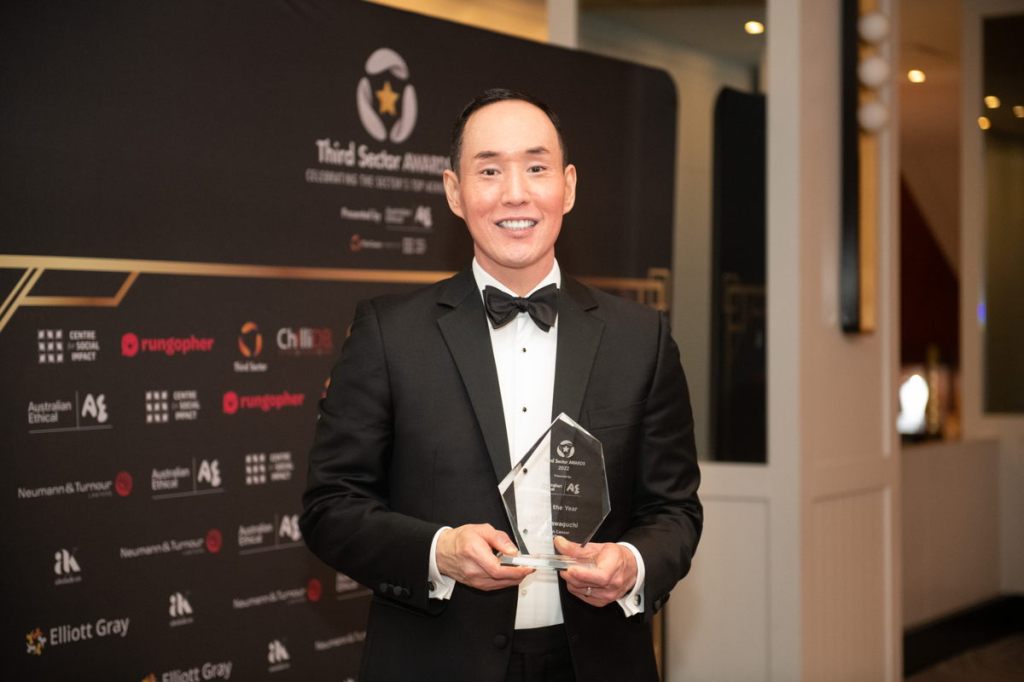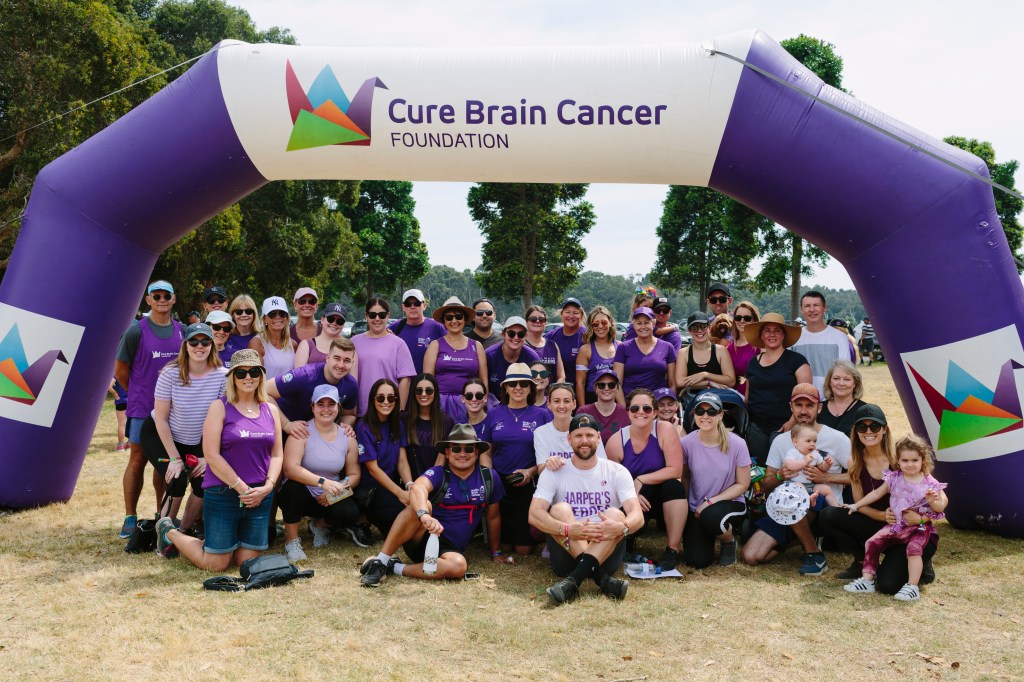‘Your mindset is one of the only things completely in your control as a leader and it is critical for moving forward effectively.’
Key Takeaways
- Brain cancer doesn’t care about borders, it is a global issue that requires a global solution
- There is momentum in the Middle East on supporting biotech companies; and researchers in Hong Kong and South Asia have made significant breakthroughs that can benefit patients across the world
- There is a need to tap into global research, breakthroughs and innovations to see progress in brain cancer treatments

Cure Brain Cancer Foundation CEO Lance Kawaguchi was awarded CEO of the Year at the 2022 Third Sector Awards that recognise the best practices and transformational contributions of not-for-profits around Australia. The Third Sector CEO of the Year award specifically acknowledges excellence in organisational leadership, social impact, collaboration, and innovation. Lance won the award after only his first year as a not-for-profit CEO.
What are the areas in which you have had the most impact since you became CEO of Cure Brain Cancer Foundation?
When I commenced as CEO of Cure Brain Cancer Foundation it was critical to spend time identifying key areas that needed to be addressed, to ensure we optimised our impact to best support the brain cancer community. One of them was the long-standing commitment to the community to get the GBM AGILE trial to Australia. The other was funding impactful research to get more innovations in the laboratory that would hopefully translate to more treatments.
We announced our commitment of $8 million dollars to sole fund the GBM AGILE trial to Australia in March of this year. To give it some perspective, the GBM AGILE trial is currently running in 40 sites in multiple countries and is the latest most promising trial for glioblastoma, which is the most common brain cancer with a survival rate of fewer than 5 years.
I have spent significant time talking to researchers, clinicians and academics on the dismal survival rate of those impacted with brain cancer. It is unacceptable that the brain cancer survival rate has remained unchanged in 30 years. I focused on understanding the gaps in the process and how we could surmount them.
Supporting researchers in brain cancer was and remains one of the biggest challenges to date. The research sector is not adequately protected and there are not many incentives for researchers to continue in the sector. We need innovations in brain cancer and supporting researchers is critical. Our Brilliant Minds program supports Early career researchers with a 3-year fellowship grant to take up research in brain cancer and this year we also launched our Mid-Career Fellowship awarding it to Dr Voon for her innovative work with pediatric gliomas.
Brain cancer affects children and people in the prime of their lives, so our focus is to support research that can circumvent the blood-brain barrier in order to get new treatments for our community. Funding translational research is a significant step in the pathway to accessing these new treatments. This year we also launched our inaugural Clinical Accelerator, the largest in the world, to support biotechnology companies and researchers to take treatments from the labs to the clinics.
The community that we serve at the Foundation doesn’t have the benefit of time so it is our duty to move at the pace they require us to. In a sector that is traditionally slow moving, I have made impact by ensuring we move as fast as we can to find new brain cancer treatments and bring clinical trials to Australians living with brain cancer sooner. Disrupting the status-quo is an important aspect of my impact. When I started with the Foundation, we quickly realised that the existing mission statement didn’t address quality of life of patients.
After consultation with our community, I led an organisational strategy to revamp our Foundation’s mission to better meet their needs.
The Foundation had been in the midst of a crisis due to previous tumultuous leadership and our income streams were being impacted by the inability to hold in-person fundraising activities. My response was leading the organisation into a digital-first approach and pivoting our operations. As a result, we were able to keep our costs low and increase our margins to ensure the most fundraising dollars were directed to key outcomes and the people who need it most. We’ve managed to invest $11 million into research in a 9-month period, more than the previous 6 years combined.
What made you become involved and where does your energy and inspiration come from?
My energy and inspiration stems from honouring my mother who passed away from
pancreatic cancer in 2016. In her last days she encouraged me to take a break from my
successful corporate career in investment banking and make a difference in the world. I
began researching how I could do this in the cancer space and learnt about how the NFP
sector and biotechs work. When I discovered how many children are affected by brain cancer
and that it is the disease that kills the most Australian children, this motivated me to dedicate
myself to this cause in honour of my mother as she was a school teacher.
I now use the skillset and networks that I developed from my 25-year finance career to
disrupt the status-quo in the sector and strive to bring meaningful change to people living
with brain cancer sooner.
After recently winning the Third Sector CEO of the Year award, I put out a challenge to other
bankers and corporates alike, to take a year off and do something amazing to give back to
the community. If I can achieve what I have in less than a year, imagine the social impact
others could also make.
How are your moves to take things more international increasing the potential of finding a
global solution for brain cancer? Where does Australia fit into the picture globally?
Brain cancer has previously been called ‘the forgotten cancer’ and it is my personal mission
to put brain cancer on the global map in everything that I do with the Foundation. Brain
cancer doesn’t care about borders, it is a global issue that requires a global solution.
In my discussions with industry leaders, researchers, thinkers and academics, I found that
there is no global leader or charity leading the movement against brain cancer. As someone
who has worked in over 15 countries, I believe collaboration is the only way to move forward if
we are to change the dismal status of lives lost due to this disease. In the US, there has been
significant progress with new trials for brain cancer patients; there is tremendous momentum in the Middle East on supporting biotech companies; and researchers in Hong Kong and
South Asia have made significant breakthroughs that can benefit patients across the world.
I believe we need to tap into global research, breakthroughs and innovations to see progress
in brain cancer treatments. Brain cancer is especially challenging because of the blood-brain
barrier that inhibits treatment from reaching the tumour cells in the brain and we need the
best minds from across the globe to work on surmounting this obstacle.
We are expanding in the US to get important trials like the GBM AGILE to Australia, so that
people here have access to the latest treatments available globally without having to spend
millions of dollars in travel overseas to get treatment.
The US has a massive ecosystem supporting biotechnology companies that play a crucial
role in translational research that is necessary for getting new drugs and treatments to the
market. In Australia and New Zealand, researchers successfully make discoveries, but have
difficulty translating those discoveries into new therapies for patients. This is mostly due to a
significant funding gap, where therapies fail to advance into the clinic. Supporting
biotechnology companies to take up translational research is a big part of my vision.
Across the globe there is great interest in healthcare, genomics, immunology and we want to
support biotechnology companies so that innovations are not lost in the lab and some of
them can potentially move to be life-saving treatments.
My strategy is to fund promising research anywhere in the world with the caveat that clinical
trials be run in Australia to help local patients. The ultimate goal is to have high levels of
investment placed into brain cancer research so that the survival rate increases, similarly to
other types of cancer that have seen significant funding to enable their research. Breast and
prostate cancers have seen extraordinary increases in survival rates, in part because of the
level of investment.
Can you explain what the brain-cancer dedicated Clinical Accelerator program is and why it
will make a difference?
In 2021, Cure Brain Cancer Foundation launched the world’s largest brain cancer-dedicated
Clinical Accelerator, worth up to AUD $2 million, to progress ideas from early-stage, pre-clinical research, into a therapeutic product that will benefit patients suffering from brain
cancer. Programs like the Clinical Accelerator are important as they encourage academic
researchers to advance their most ambitious ideas into clinical development.
It costs approximately $2.8 billion for one drug to pass through the discovery and
development phases to reach FDA approval. It is a risk-taking endeavour for biotechnology
What actions, behaviours and traits make a leader a better or more successful leader?
In my opinion the most important qualities in a leader are adaptability, innovation, vision and mindset.
As a leader it is important to have a strategy for where you’re heading but truly exceptional leaders are agile to adapt plans on the go as required. Particularly in environments like the pandemic, it is vital as a leader to embrace change, be flexible and take unpredictability as a chance to find new opportunities or innovate.
Leaders need to approach the status-quo and new situations with innovation as a key trait to find creative ways to enact change and drive their organisation forward. Digital transformation has been vital for the Foundation as we innovate so that we best reach our community and diversify our fundraising to ensure sustainability.
Having a strong vision is vital to ensure operations are headed in the right trajectory. Ensuring that each step brings an organisation closer to achieving a goal or mission is key to good leadership. Sharing your vision with your team helps encourage and motivate them to be a part of it.
Finally, your mindset is one of the only things completely in your control as a leader and it is critical for moving forward effectively. As CEO of the Foundation, I’m instilling the unwavering effort and positive attitude that the brain cancer community deserve into my approach and the organisational culture at Cure Brain Cancer Foundation.
